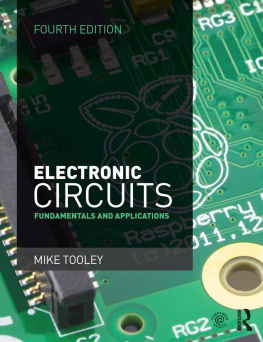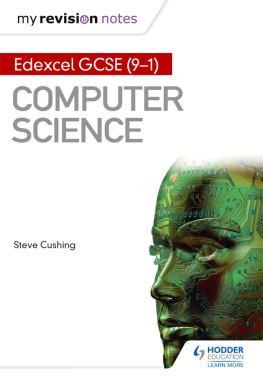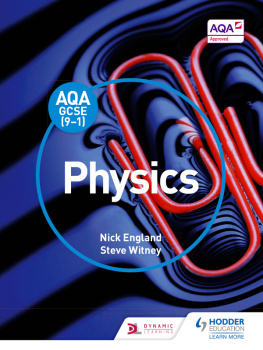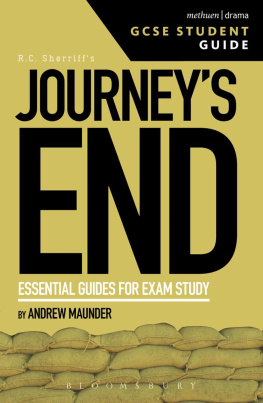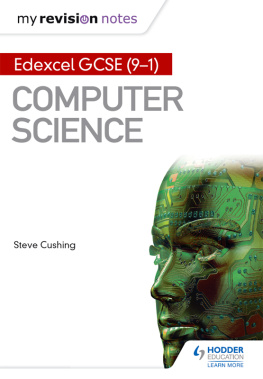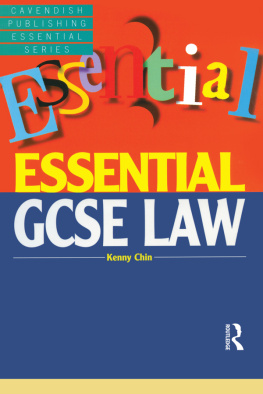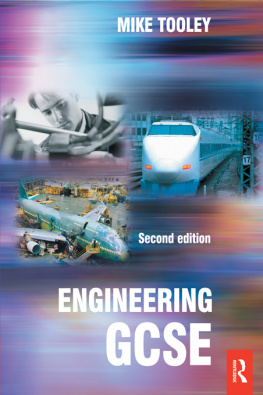Engineering GCSE
Curriculum Resource Pack
Mike Tooley
Vice Principal
Brooklands College of Further and Higher Education

Newnes
An imprint of Elsevier
Linacre House, Jordan Hill, Oxford, OX2 8DP
200 Wheeler Road, Burlington, MA 01803
First published 2004
Copyright 2004, Michael H. Tooley. All rights reserved
The right of Michael H. Tooley to be identified as the author of this work has been asserted in accordance with the Copyright, Designs and Patents Act 1988
No part of the publication may be reproduced in any material form (including photocopying or storing in any medium by electronic means and whether or not transiently or incidentally to some other use of this publication) without the written permission of the copyright holder except in accordance with the provisions of the Copyright, Designs and Patents Act 1988 or under the terms of a licence issued by the Copyright Licensing Agency Ltd, 90 Tottenham Court Road, London, England W1T 4LP. Applications for the copyright holders written permission to reproduce any part of this publication should be addressed to the publisher. However, the pages in this book may be copied for use within the educational institution for which they have been purchased. Under no circumstances may photocopies be offered for sale or distributed for use outside the purchasing institution.
Permissions may be sought directly from Elseviers Science and Technology Rights Department in Oxford, UK: phone: (+44) (0) 1865 843830; fax: (+44) (0) 1865 853333; e-mail: ), by selecting Customer Support and then Obtaining Permissions.
British Library Cataloguing in Publication Data
A catalogue record for this book is available from the British Library
ISBN 0 7506 5645 X
For information on all Newnes publications visit our
website at www.newnespress.com
Printed and bound in Great Britain
Contents
Introduction
The GCSE in Engineering is a nationally recognised and accredited qualification designed to provide you with a choice of routes into further education or employment. The GCSE in Engineering is a double award equal to two GCSEs. It is therefore twice the size of most GCSEs and represents twice the work that would normally be associated with a single award. The GCSE in Engineering is a vocational GCSE. This means that it is directly relevant to anyone who may be thinking about a career in engineering
The GCSE in Engineering provides opportunities for students to develop a variety of skills together with the basic knowledge and understanding that underpins the design and manufacture of engineered products. The course also provides students with an opportunity to make informed choices for further study and eventual employment.
This resource pack covers the three units that make up the Engineering GCSE Advanced VCE in Engineering programme. One section is devoted to each of the mandatory units and each section begins with a brief introduction to the unit before going on to explain what students should learn. Detailed information is then given relating to assessment and grading or external examinations (as appropriate). In all cases, however, it is essential for teachers to be aware of current information on assessment and moderation available from the relevant awarding body (i.e. Edexcel or OCR). Many schools and colleges will already have this information to hand but it can also be obtained from the appropriate awarding bodys website, i.e. www.edexcel.org.uk for Edexcel and www.ocr.org.uk for OCR.
Teaching and assessment strategies are discussed and the resources required for delivery of the unit are listed. Opportunities for developing links between units are identified together with a variety of student activities that can be used to generate evidence to support the development of a Key Skills portfolio.
A sample teaching scheme is included for each of the units. However, it is worth noting that many other schemes are possible and tutors should consider their own pattern of teaching before modifying or extending these schemes to their own situation.
A selection of masters for use as the basis for overhead projector transparencies and/or class handouts are provided within each section. Where appropriate, worksheets, examples, activities and investigations are also provided. Once again, tutors should consider the applicability of these materials before incorporating them into their own teaching programmes.
About the Engineering GCSE
Engineering covers a wide range of disciplines including mechanical, electrical, electronic, aeronautical, marine and automotive sectors and the Engineering GCSE enables students to develop a broad knowledge and understanding of the engineering industry, its organisation, products and processes through investigation, research and practical application.
In common with other GCSE qualifications in vocational subjects, the Engineering GCSE is designed to prepare students for employment, including work-based training, progression to level 3 qualifications and provide an insight into engineering for candidates pursuing other career pathways. The qualification will introduce the skills, knowledge and understanding needed in engineering.
The Engineering GCSE builds on students previous experience in a number of national curriculum subjects at Key Stages 1, 2 and 3 and satisfies the requirements for programmes of study at Key Stage 4 for Design and Technology in England.
The Engineering GCSE specification must consist of three units, as follows:
- Unit 1: Design and graphical communication
- Unit 2: Engineered products
- Unit 3: Application of technology
The specification requires students to demonstrate an ability to:
- recall and apply their knowledge, skills and understanding specified in the subject content in a range of vocational situations (AO1)
- plan and carry out investigations and tasks, using a range of tools, equipment, material, components and processes, in which they analyse vocational issues and problems; and gather, record and analyse relevant information, data and other forms of evidence (AO2)
- evaluate evidence, make reasoned judgements and present conclusions accurately and appropriately (AO3).
Each unit is separately assessed and the weightings for the Assessment Objectives are as follows:
| Unit 1 | Unit 2 | Unit 3 | Whole qualification |
| AO1 | 30-45% | 30-45% | 45-70% | 35-45% |
| AO2 | 30-45% | 30-45% | 15-30% | 25-35% |
| AO3 | 30-45% | 30-45% | 15-30% | 25-35% |
The Engineering GCSE is particularly appropriate for young people who may wish to enter a career in engineering at a fairly early stage and who wish to progress to further studies at level 3 in an engineering or engineering-related subject. As a consequence, delivery of the qualification is greatly enhanced when a partnership exists between school and Further Education providers. Indeed, many of the successful 14-19 partnerships between schools and colleges are based on supporting and enhancing vocational GCSE awards and most of these schemes include the Engineering GCSE as an option for students at Key Stage 4.


